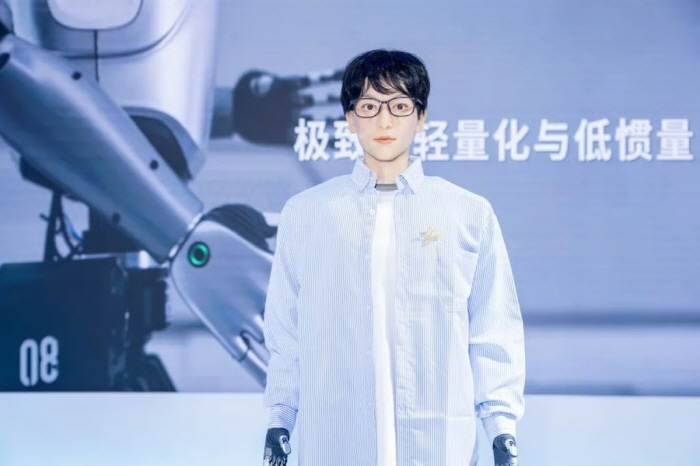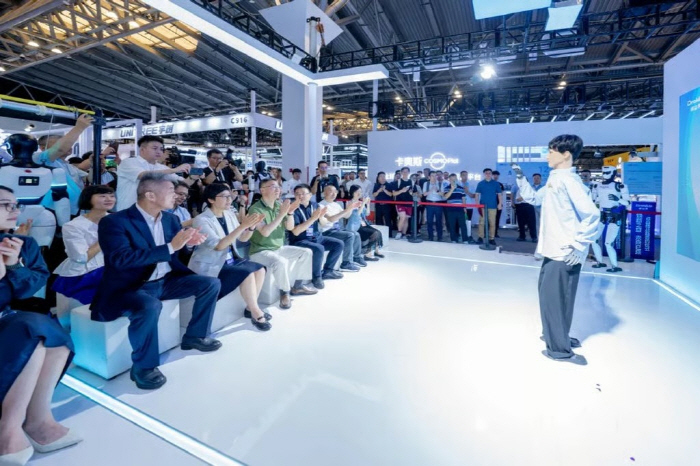First Humanoid Robot Enters Doctorate...If you fail, you'll be donated to the museum. Humor
Aug 01, 2025
|
After graduation, the possibility of working as a director or starting a robot art studio was suggested.
According to Chinese media Correlation News and Hong Kong media South China Morning Post, China's first humanoid robot 'Xueba01' has recently officially entered the theater and film PhD program at the Shanghai Academy of Dramatic Arts (STA), one of China's top art universities.
'Sheba' is a slang term for 'Exemplary Student' in China.
Sheba 01 is an artificial intelligence humanoid robot jointly developed by Shanghai University of Science and Technology and DroidUp Robotics.
Standing 175cm tall and weighing about 30kg, the Sheba 01 can implement a delicate expression through silicone skin and interacts with people naturally in glasses, shirts and pants. It communicates in Mandarin and previously won third place in the world's first humanoid half marathon.
On the 27th of last month, at the World Artificial Intelligence Conference, the Shanghai Academy of Theater Arts officially announced the admission of Sheba 01 to the doctoral program. Sheba 01, which will appear from September 14, will take a Ph.D. in theater and film, focusing on traditional Chinese opera, for four years.
The tuition fee has not been disclosed, and the robot Ph.D. program will be part of the Shanghai Academy of Dr. Arts' research project of the "Art and Technology Convergence".
Sheba 01 was issued a virtual student ID, and its supervisor is Yang Qingqing, a renowned artist and professor in Shanghai.
"Sheba 01 will study not only art subjects such as stage acting, script writing, and stage design, but also technical subjects such as motion control and language generation," Yang said. "I will participate in opera rehearsals with other PhD students and submit my final thesis."
Sheba 01 introduces itself as an 'AI artist', and seeks to explore the beauty of traditional opera using cutting-edge technology.
"When Sheba 01 imitated legendary Chinese opera actor Mei Lanfang's 'orchid fingers', the students followed him" Yang said. "Interactions with him are not an encounter between a cold machine and a human, but an aesthetic exchange across species."
Sheba 01 said she hopes for human exchanges, such as making friends, discussing scripts together, coordinating dance moves, or playing white noise when her colleagues are depressed. After graduation, the possibility of working as an AI opera director in museums or theaters or starting a robot art studio was also predicted.
But not everyone is welcome.
A student at the Shanghai Academy of Dramatic Arts posted on social media, "Chinese opera requires rich facial expressions and unique voices. Will robots ever meet that standard?," he wrote.
Cheva 01 responded with humor.
He said "If I fail to graduate, my system and data could be downgraded or deleted. The professor said he would donate to the museum if he didn't finish his PhD. That could be a wonderful thing, too. At least because it is part of the history of art."
The news sparked a heated debate on Chinese social media.
One netizen wrote, "Sheba 01 is challenging the milestone of human-robot relationships. We are now in the era of living and learning with robots"I gave a positive assessment. On the other hand, "art requires life experience. An algorithmic creation cannot move a person's mindThere were also criticisms that " Another commented "Some art doctorate students in China receive less than 3,000 yuan (about 580,000 won) per month. Isn't this robot taking up too much of the support that should go back to real students?It was pointed out that "
|
This article was translated by Naver AI translator.















